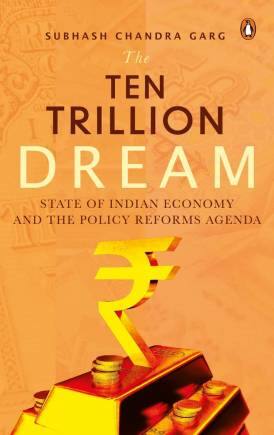



What will it take to chart a high-growth trajectory for India? Probably a break from the past and a fresh line of thinking. That’s precisely what former Finance Secretary Subhash Chandra Garg offers in his debut book, The $10 Trillion Dream. It is a compelling narrative, an expansive blueprint of sorts for the country’s turnaround and emergence on the world stage.
 “India has been a slow and reluctant reformer. This has delayed reaping of the advantages of new and emerging technologies and production shifts. We cannot afford to commit the same mistakes again in mainstreaming the digital and environmental economy,” he writes. It is, hence, imperative to shape a robust policy reforms agenda that will spur higher GDP growth—this is the premise on which he builds.
“India has been a slow and reluctant reformer. This has delayed reaping of the advantages of new and emerging technologies and production shifts. We cannot afford to commit the same mistakes again in mainstreaming the digital and environmental economy,” he writes. It is, hence, imperative to shape a robust policy reforms agenda that will spur higher GDP growth—this is the premise on which he builds.
Garg cuts across the economic landscape with an ease and familiarity that only a seasoned bureaucrat and policymaker like him can afford to. There is no facet left untouched—current trough in the economy, Covid fallout, sectoral performance, economic policy journey since Independence, the twists, turns and travails along the path, and the fundamental reset brought about in the 1950s and 1990s.
Macroeconomic dimensions, too, are analysed in-depth—fiscal finance, state of currency and money, public debt, investment, tax and non-tax revenue, trade and commerce linkages, and so on. What emerges is that all’s not well with the country’s policy environment.
Besides its sheer granularity, what makes the book stand out is the collective context in which it is set—combining past lessons, present-day challenges, and future needs. Also, it packs voluminous data that supports the arguments put forth.
Growth patterns are invariably the product of a country’s policy choices, and a flawed approach definitely takes its toll. India has suffered a lot on this count and the need of the hour is to bring about a drastic shift. “The world is becoming one large market and production system. We need to be able to conquer world markets to earn incomes for raising the standard of living of all Indians and create the wealth to become a high-middle-income country by 2035,” says Garg.
Economic Policy Framework 3.0—that can help grow the country’s economy to $10 trillion by 2035—should be shaped around five fundamental reforms, he points out. All of these would demand a marked change in the way the role of the state is widely understood and perceived. For instance, one of his suggestions is to get the government out of the business of producing private goods and services. This will entail privatisation of all commercial public sector undertakings. Also, it should focus on production of common/public goods and services. Concerted efforts have to be made to make the economy digital, ensure environmental sustainability, and for fundamental restructuring of agriculture and industry, he writes.
Garg’s observations are bold, sharp, and incisive throughout—he talks about muddled policies in data and e-commerce; ill-suited ones in education and health, poor policy framework for a digital economy, “faulty” lockdown strategy, and so on. Most importantly, he explains why the goal of a $5 trillion economy by 2024-25 is beyond India’s reach. According to him, achieving it by 2026-27 would be a more realistic goal, with the signs of positive change around—Covid disruptions easing out, global growth returning to more normal levels, and considering India’s inherent dynamism in cashing in on the digital economy.
The $10 Trillion Dream is by no means an easy read. One has to stay patiently with the author as he walks us through, baring the perils and the perks that lie ahead. Some of the reforms suggested may appear radical too, but they just reflect the need to keep pace with the times.
Pursuing the familiar is passé in a disruptive world. The way to break new ground is to rethink, reassess, and reprioritise. This is the most valuable insight to be drawn by political and business stakeholders, those willing to look beyond the immediate and the short-term.
Discover the latest Business News, Sensex, and Nifty updates. Obtain Personal Finance insights, tax queries, and expert opinions on Moneycontrol or download the Moneycontrol App to stay updated!
Find the best of Al News in one place, specially curated for you every weekend.
Stay on top of the latest tech trends and biggest startup news.